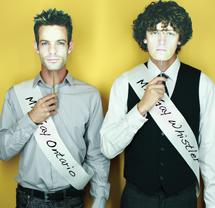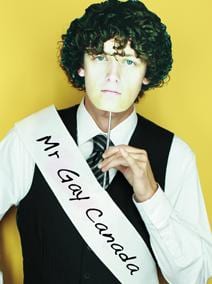
Credit: David Ellingsen photo
Next week Vancouver and Whistler will play host to the first-ever Mr Gay Canada competition. According to the competition’s mission statement, “the primary purpose of Mr. Gay Canada (MGC) is to identify leaders who will take responsibility not only in his own community but on a global stage speaking out for equal rights. MGC is a positive role model and will work on humanizing being gay in the media both queer and mainstream.”
The three-day competition involves photo shoots, interviews and an eco-challenge where contestants will be scored on a wide range of personality traits from knowledge of current events to their ability to work as a team. While the specifics of the competition are being kept under wraps, we do know that 15 percent of points will be awarded for appearance, leaving 85 percent for substance.
The winner will go on to compete for the Mr Gay International title in Hollywood, now in its fourth year. But far from the Miss America persona that seems to overshadow events such as this, organizers Dean Nelson and Terry Costa want everyone to know that this is no beauty contest.
“For me MGC is the furthest thing from a beauty pageant,” Nelson explains. “After seeing Mr. Gay Europe and Budapest Pride where we had eggs filled with acid thrown at us as well as rocks, bricks, tear gas and pepper spray, it gave me crystal clarity as to why I was there and what this competition is all about. We get wrapped up in our own little bubble and say we have all the rights, privileges and freedoms that we want, so what’s next? We think the fight’s done but it isn’t.”
The scene is reminiscent of the early days of gay liberation in North America, one that, according to Nelson, many of us have forgotten about even though we enjoy the rights and freedoms that early activism won us.
“I think we are very complacent in the rights and privileges that we have,” says Nelson. “We forget that 30 years ago it wasn’t so easy to be gay. You don’t have to go very far to see that there are still challenges. You can go up north or into Alberta. It could be down in the States or all the way to Budapest or Bulgaria where it’s very hostile. The exciting thing with MGC is that he is going to be able to go to these places and come back to his community and say that the fight is not over. This is what’s out there and what’s happening.”
There is no cash prize for this competition. Instead Mr Gay Canada will use his title to pledge support to gay causes and raise awareness of gay human rights issues in Canada and abroad, and to promote Canada as a tourist destination.
“It’s not a prize contest,” Costa explains. “It’s a chance to be an ambassador, so the winner will get to go places and represent Canada. We need to ensure that MGC is somebody who can speak well, present themselves well and present our country well.”
The fledgling competition is still trying to beef up its brand in order to attract more delegates from different cities across Canada. With five weeks to go before show time, only eight delegates had signed up to compete: four from BC, two from Ontario, one from Alberta and one from the Yukon. Now applications are flooding in daily.
Last year, Nelson quietly interviewed a few potential candidates whom he thought embodied the spirit of Mr Gay Canada and directly appointed James Coburn to the title.
Coburn has been out of the closet for four and a half years and is recovering from anorexia, a disease he has been struggling with for 20 years.
“He was really passionate about a couple of causes,” Nelson notes. “One being body dysmorphia and that’s something that in our own community doesn’t get talked about much and this is an opportunity for us to get out there and start a dialogue.”
“Dean approached me in the fall about it,” recalls Coburn. “At first I thought it was just a beauty pageant, but after looking into what Mr Gay International was and what he wanted from MGC I considered it and he interviewed me. After discussing current events he asked me what it meant for me to be gay and I told him it’s fine. I’m proud I’m out. I don’t shy away from being gay but it’s just one part of me. It does not define me as an individual.”
Another portion of the Mr Gay Canada mission statement says: “The MCG competition is especially concerned with gay men being viewed as the ‘other,’ as outsiders to the rest of the world. Humans have a natural propensity to distrust ‘the other’ and tend to project negative feelings away from themselves. The media has easily established the ‘gay stereotype’ — quick think of what it is in your mind — and we know that limited image does not represent all of us.”
“Most people know I’m gay when I’m working for charitable organizations outside of the gay community,” says Coburn. “I think it gets people more exposed to what gay people are like. I’ve gotten the ‘Oh, you’re so normal’ comment a few times.”
It’s a comment that many gay people have received throughout our lives as we have had to deal with society’s preconceived stereotypes about who we are and what we do.
“It’s so easy for the media to pick up quick soundbites of a leather daddy, a circuit queen or a drag queen and that’s the persona mainstream audiences view the queer culture to be,” says Nelson. “When we say we want to humanize being gay that means that an everyday average Joe who is sitting right next to you happens to be gay. We’re looking for somebody who is comfortable in their own skin.”
The humanized gay image could play an important role in Mr Gay Canada’s job as the gay community’s ambassador to mainstream media, Coburn suggests. “I think the media should be covering things more,” he says pointing, for example, to the lack of mainstream coverage of the recent attack on Budapest Pride.
“If it had been a straight event and it was Christians against Muslims it would have been on the front page of every newspaper. It would be nice to have these articles not just in gay periodicals but in mainstream media. MGC wants the straight community to be as supportive as it should be.”
But does appealing to a broader audience mean Mr Gay Canada has to be non-threatening to straight society?
Lest we forget, 30 years ago at Vancouver’s first gay Pride march, gays and lesbians, drag queens and leather daddies walked the streets at their own risk to confront the straight world’s notions of normalcy and diversity and carve a spot for their own sexuality — not to show how normal they were.
A figurehead like Mr Gay Canada can accomplish more today through subtle activism as a living example of an anti-stereotype, Nelson maintains. His very existence will challenge society’s prejudice and make the mainstream media and governments more comfortable dealing with the gay community, and therefore more likely to support gay causes, he believes.
“There’s an opportunity for us to lobby our local and federal governments,” Nelson insists. “We need to say that we’re having issues in Sri Lanka, we’re having issues in Hungary, and we’re having issues in Poland. We need to have the Canadian embassy in Warsaw flying the gay flag on gay Pride day to show support to the people of Warsaw. That’s what MGC is going to need to do.”
Are we really going to be more accepted by mainstream culture because we have a less threatening figurehead? And even if that is what the mainstream longs to see, is it worth the cost to our own culture and self-respect?
Ron Dutton runs BC’s Gay and Lesbian archives and has been collecting pieces of gay history for over thirty years. He has witnessed and preserved Canada’s gay community since its early days of being nothing more than a bar scene where everyone — twinks, leather daddies, drag queens and lesbians — gathered to commune and connect away from a mainstream world that didn’t want them.
“Back in the early ’80s it was fundamental rights that we didn’t have and that we needed in place,” recalls Dutton. “Things like getting into human rights codes and into hate legislation. What’s happened since then is that activism has focused on narrower subjects where laws needed to be fixed. That’s everything from the ability of gay people to adopt, to gay people being able to marry, both of which are now in place.
“Beyond that the emphasis is now on more narrow pockets of people such as ethnic groups who have formed to address issues in their own communities,” he says pointing, for example, to Sher Vancouver, a group formed this spring initially as a gathering place for gay Sikhs and now broadened to all gay Punjabi people.
“What will save us is changing people’s hearts,” Dutton says. “The surveys show that this has happened to a degree in Canada where people really do believe that we do have rights and we are okay people. That’s what will protect us in bad times. You’ve got to be mindful that the freedoms we have aren’t necessarily forever. They are going to last as long as we protect them.”
So how do we protect our rights both at home and abroad? Should we stay with the tried and true method of in-your-face activism that won us the rights we have today, or should we go with a more subtle, media-friendly approach to changing people’s minds?
Subtle activism may appeal to a more mainstream audience but it runs the risk of alienating the very people it professes to represent as it distances itself from the “stereotypical” among us.
Can we find a middle ground that will inspire all Canadians to stand up for gay rights abroad without abandoning our most flamboyantly proud right here? Does such a ground even exist? And if it does, would any of us want to live there?
As social activist Clare Boothe Luce once said, “No good deed goes unpunished.”
At the heart of this competition is the desire for a few individuals to stand up and make the world a better place. In a community that throws pageants like they’re going out of style, isn’t it refreshing to see a competition honour something besides best butt or sexiest underwear?
“It’s encouraging that a competition like this that has a little substance,” says Dutton.
At the same time, he says, “I don’t want to do away with the screaming queen or the leather boy. They’re part of the world too. What I do want to do is ensure that there is a wider representation of gay people. If we’re to be included, we have to be inclusive.”
According to Nelson, the most important part of the Mr Gay Canada competition is to find a strong leader, whether he abhors the gay stereotype or epitomizes it.
“Right now we are looking at all applicants,” says Nelson. “If a bitchy queen ends up being the person that’s going to be a really strong leader, then that’s who we need to go with. That might not fit what our perfect image is, but those are just guidelines.”

 Why you can trust Xtra
Why you can trust Xtra


